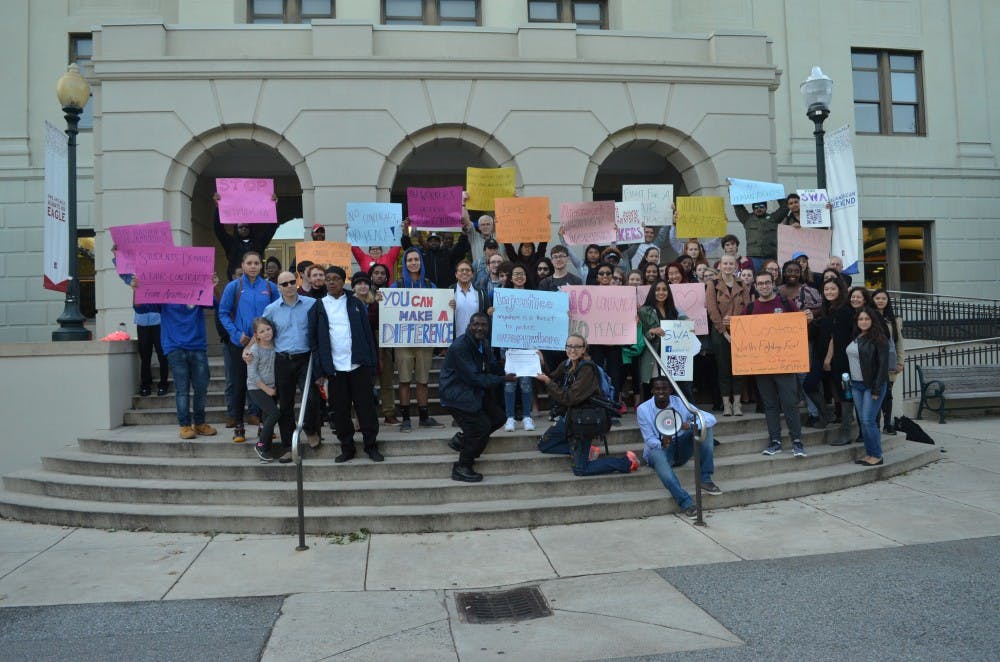“No contract, no peace!”
That was the chant of students, faculty and workers on the steps of the Mary Graydon Center on Oct. 12 at a rally in support of Aramark workers at AU, who are fighting for better working conditions and higher wages in new contracts that are being discussed right now.
Last Friday, the committee of AU workers that represents the 200 workers on campus met with Aramark to discuss the terms of their contracts for the coming year, but an agreement couldn’t be made due to unsatisfactory terms, according to members of the committee.
The demonstration was organized by the Student Workers Alliance, which represents and works with the employees of Aramark on campus through the organization of events, and promotion of workers’ well-being.
“The workers really are the foundation that keeps this institution together and running,” Sofia Kahn, a sophomore in the School of Communication who attended the rally, said. “We have to respect them so much, and appreciate everything they do. We want to do everything we can to show that this is something we care about as a student body.”
After an hour-long rally on the quad, the group, consisting of workers, students and faculty, moved inside of MGC to encourage students to sign petitions for Aramark workers’ rights.
Professor Cathy Schneider of the School of International Service was one of the faculty members in attendance.
“We are asking people to serve the University... and they’ve been kind and generous and helpful and have gone out of their way to help people,” said Schneider. “And most of the time, they are treated like furniture, they’re invisible. And part of the ways in which they’re invisible is a juncture of class and race, so it makes it easier for people at the University to ignore [minority workers] rather than understanding them as an integral part of the University.”
Schneider feels that the Aramark contract negotiations are only the start of the change that needs to occur on campus in terms of equality for all employees. She remembers a time when all employees of the University were able to reap the benefits of retirement, but since workers were contracted through Aramark, the administration took the rights of food service workers away, Schneider said.
After the committee’s meeting with Aramark on Oct. 19, when the workers’ committee will provide its counter-offer, SWA is organizing a student boycott of TDR the next day on Oct. 20, according to SWA leader German Figueroa. The group hopes this will send a message to Aramark that the AU community is in support of the basic rights of these workers.
“The goal of the rally today is to let Aramark know that the workers are really trying to have more sustainable lives on-campus,” said Anthony Randolph, a member of the negotiation committee, and a 15-year employee of AU. He added that many Aramark workers, who consist largely of minority and senior employees, are in need of higher wages in order to sustain their livelihoods.
Randolph said he is fighting to ensure that the new contract includes better pensions for financial security, cheaper health insurance and at least a $.50 increase in pay per hour. Many employees struggle to reside in the D.C. area due to the high cost of living and disliked Aramark’s offer of an extra $.20 per hour, according to Randolph.
He also hopes that more freedom will be allowed to the employees of TDR so that there can be better facilities in their kitchens, and a greater role in choosing the menus offered at on-campus dining locations. Randolph said he feels that a better workplace is necessary for the staff to thrive and for AU’s services to continue to grow.
“This is our lives, so this is the fight we have to fight,” Randolph said.
Karen Cutler, Aramark’s vice president of corporate communications, declined to comment on private contract negotiations.
“I can assure you that we continue to bargain in good faith and are committed to reaching an agreement that works for everyone,” Cutler said.
Past reporting from The Eagle has revealed that a high number of senior Aramark workers are forced to keep their jobs into their 60s and 70s because they cannot afford to retire. The University has also refused to supplement Aramark’s pensions plans and has not offered senior employees access to a retirement fund.
“Due to the fact that the contract has been up and they’re in the midst of negotiations, we’re trying to show solidarity with the workers, and just show Aramark that these students are also watching,” Gabriela Reyes Ventura, a sophomore in the School of Public Affairs and treasurer of SWA, said. “We want better pay for the workers, we want better treatment for the workers, and just in general awareness that we are here and we are watching.”
Many other student organizations attended the rally, including the Black Student Alliance, League of United Latin American Citizens, the Asian-American Student Union and The Darkening. Leaders of SWA encourage all clubs on campus to take part in the boycott of TDR and to sign the petition against Aramark.
“I wish for...just for better work,” Phillip Outlaw, a 10-year employee of AU, said. “They treat us wrong. It’s about equal rights.”





